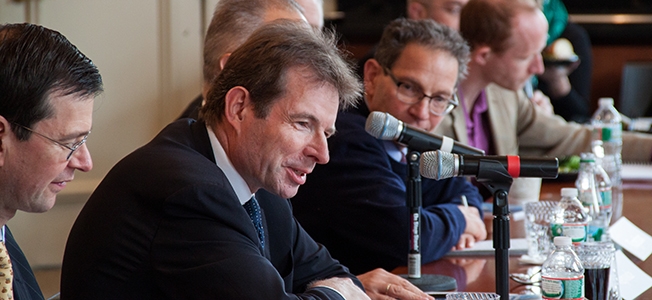
Building a modern European Union: What's wrong and how to fix it
On Thursday, November 21, 2013, the German Marshall Fund of the United States (GMF) hosted a roundtable discussion with Charles Grant, the founder and director of the Centre for European Reform on the current state of the European Union. Ivan Vejvoda, Vice President of Programs at GMF, moderated the discussion, during which Dr. Charles Kupchan, senior fellow with the Transatlantic Academy at GMF, provided his expert commentary on Mr. Grant’s proposals for EU reform. The roundtable discussion was attended by more than 40 people, which comprised of government officials, representatives from embassies, think tanks, and academia.
Mr. Grant began the discussion describing the current state of the European Union. He argued that for the first time in its history, Germany is the most powerful country within the union, while the usual dominant actors like France or Britain are restrained by their own domestic issues. This leaves Germany in the unique position to effect any proposed EU reforms, and will be the key actor in ensuring their success. With that in mind, Grant laid out the issues hampering EU governance. Primarily, he stated, the EU commission is too weak. There are too many rules and regulations that the commission has to abide by, making it too reliant on the EU parliament. However Grant doubts if there is the political will to enact reforms to the EU commission, especially if it were to come in the form of a new treaty. Fortunately, a new treaty simply won’t be necessary, because the reforms he proposes are minor enough that they can be enacted through the normal legal processes.
Grant then laid out each of his proposals that address the issues he previously stated. First, in order to strengthen the EU commission, it needs more power and independence from the parliament. This can be done by streamlining the commission body and transferring the power to fire the commission to the European Council from the parliament. Next, the national parliaments need to have more involvement in the governing process. Currently the national parliaments have a “yellow card” procedure that can halt proposed legislation if national sovereignty is being infringed. Grant proposed to expand that power to current EU law as well. Additionally, Grant suggested a regular meeting of national parliaments who would supervise the work of the EU parliament. This would deeper involve national governments, resulting in greater governing legitimacy for the EU. Grant also moved in to the financial realm, stating that there needs to be greater liberalization of EU markets. He mentioned that the creation of a single service market, as well as a single digital market would be vital in the success of greater EU reform. Further, the future negotiations of any free trade agreements (FTAs) shouldn’t be hampered by burdensome rules and regulations, Grant argued. Currently FTAs can’t become law unless the partner countries respect human rights. He asserted that this rule would stymie the TTIP talks, and shouldn’t be applied to any other FTAs.
Providing his commentary to Grant’s reforms was Dr. Kupchan, who expressed his disagreement with the scope of the reforms. Kupchan stated that while many of these “small tweaks” may seem reasonable, they are simply not big enough to really alter the nature of the EU. Further, there is nothing in Grant’s ideas that addressed the current fiscal crisis that has engulfed the Eurozone. Kupchan then addressed the specific proposal of a national parliament conference, questioning whether this was the right time for such a large event while the EU economy is in the midst of a crisis. The EU should do what it has always done, which is fly below the radar while managing the current crisis, leaving the constitutional reforms for a later time.
Dr. Kupchan’s commentary provided the basis for the lively question and answer session that followed. First, Grant responded to Kupchan’s criticism by agreeing that the Euro crisis needs to be addressed. Going further, he laid out ideas to address it: the creation of a banking union, softening the austerity measures, and forgiving current debts were important first steps. Banking reform was in fact a consistent topic brought up during the Q&A. In multiple instances, Grant was asked to clarify his ideas on a banking union, as well as his thoughts on the CDU/SDP governing agreement, TTIP, and the UK’s future relationship with the EU. On almost every topic the disagreements were sharp, but substantive and respectful, providing an informative survey of the multitude of issues facing the European Union today.
